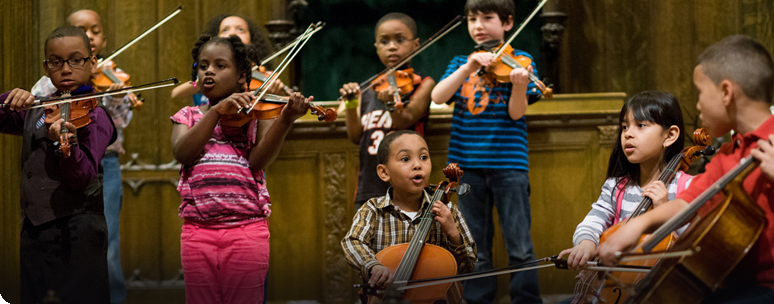Excerpts
from Notes on Phase II, Nov. 4 ’05
It
was late Friday afternoon at the end of the first school quarter. The students
dribbled in slowly with instruments and backpacks. The weather was lovely but
the week had been long and some were dragging, plopping down and stretching out
at 45 degrees, completely limp.
The
Providence Quartet moved the furniture around, creating a space in the big room
full of round tables and chairs in which to make a circle. There were over
twenty of us: the students, the Providence Quartet, Rob Jones (the
facilitator), and myself. Rob began by asking three questions: what has been
going well for you, that is, what are you proud of? What have you not been doing, or what are you feeling bad
about? And how are you feeling about
Phase II in particular?
Some
of the students volunteered, and after that we went around the circle including
everyone who had not yet spoken (me too, as the only comparative stranger). The
good news included being on the honor roll, getting high honors, working on the
yearbook, and the bad news included getting an F in algebra, having a terrible
time with a job. Some of the disappointments were spoken so quietly, often with
head down, or hand over the mouth, that it was hard to hear. The remarks seemed honest and the fact they
were willing to share them suggested this was already a group that had
developed considerable trust.
The
staff also spoke of ups and downs – a successful performance, planning a
wedding (hearty applause), good practicing, illness, and neglected paper work
at home. When it came to the Phase II
question, the Providence Quartet members expressed frustration with getting the
new Phase II quartets started, as members would fail to show up at scheduled
times, leaving the others handicapped. Students also regretted not making the
quartets a priority among the many things they were trying to do. Rob zeroed in
on the new quartet program and the need to make membership a commitment.
Someone asked about the plan to play in the community. Rob opened up a
discussion about how the quartets would decide what venues in the community
they would like to play in.
At
first, people were vague about how to proceed, and he reminded them that they
had been given a three page handout, which described the steps in detail for
developing ideas for sites, contacting a key person to explain about the
quartet initiative, finding possible dates to play at the site, checking out
proposed dates with quartet members etc. He directed each quartet and their coach
(member of the PSQ) to work together for ten minutes and brainstorm possible
venues, identifying a contact person where possible. The groups moved swiftly
to work, as if this was important to them.
When
the groups reported back they had identified excellent community venues where
they might play – sites with which they had some familiarity — City Hall, the
school and the community center, both of which provide space for their lessons
and workshops, a library, a nursing home where a parent worked, the sidewalk by
the storefront office of CMW and others. The students worked with great
attention and the reporting back was done with clear, strong voices, — unlike
most of the earlier communication — with some lively interaction between the
groups, a bit of competition for the "best" list, some delight on
coming up with some of the same places.
After
a supper of chicken wings and drumsticks, bread and salad, the seats were
rearranged in a half circle for the first master class in the new quartet
program with Jenny Elowitch, a professional violinist invited down from Boston
to work with the Phase II students that evening.
By
the time they had worked for forty minutes, the piece was sounding very
together and pleasing. The students had learned that the first violin may not
be the key voice in spite of its prominence, that rhythm may come from moving
notes rather than emphasized beats, that learning to listen to what each part
is playing is part of the undertaking of quartet playing. She had built on what
she had covered with Tae in interaction with the group on dynamics, and how you
can make a greater distinction between a forte and a piano. Moreover, a number
of students who thought they had things all figured out were enabled to see how
much more was going on than they thought. The interplay between the audience
and the players as elicited by Jenny’s questions and ways of involving them in
mutual support and inquiry further strengthened an environment of interdependence.
-Karen Romer, Board
of Directors


